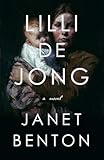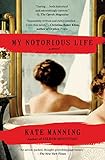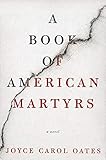
God has strong opinions on reproductive rights, at least according to many Americans. Our new vice president, who “made a commitment to Christ [as] a born-again, evangelical Catholic,” led a frontal assault on reproductive rights as a member of the U.S. House of Representatives. As governor of Indiana, he defunded Planned Parenthood and signed multiple anti-abortion bills into law, including measures to prohibit private insurers from covering abortions, and one of the most extreme anti-abortion bills in the country.
Five recent and forthcoming books address the fallout from America’s long, fraught wars over reproductive rights. Religion plays a central role in all of them.
 Lilli de Jong, Janet Benton’s confident, forthcoming debut, is set in 1880s Philadelphia. Steeped in her Quaker upbringing, Lilli flees her family after becoming pregnant by an apprentice in her father’s furniture workshop. Although their affair is consensual, Lilli’s lover leaves for better economic prospects in Pittsburgh, and her efforts to inform him of his fatherhood end in frustration and worse.
Lilli de Jong, Janet Benton’s confident, forthcoming debut, is set in 1880s Philadelphia. Steeped in her Quaker upbringing, Lilli flees her family after becoming pregnant by an apprentice in her father’s furniture workshop. Although their affair is consensual, Lilli’s lover leaves for better economic prospects in Pittsburgh, and her efforts to inform him of his fatherhood end in frustration and worse.
Lilli’s recently deceased mother had a favorite maxim: “If our principles are right, why should we be cowards?” In that vein, Lilli makes the agonizing decision to keep her daughter, Charlotte, birthed in a home for unwed, destitute (read — fallen) women. Lilli’s fight for economic security is increasingly thwarted as she faces a society that condemns both her pregnancy and her decision to mother.
Lilli de Jong is informed, but not overwhelmed, by research. Written in first-person diary form using the Quaker pronouns “thee” and “thou,” Lilli de Jong’s voice artfully and convincingly reflects her time. From the opening inscription — an 1880 report of the State Hospital for Women and Infants — the reader confronts injustice. “Every other door…is closed to her who, unmarried is about to become a mother. Deliberate, calculating villainy, fraud, outrage, burglary, or even murder with malice aforethought, seems to excite more sympathy…”
Sentence by carefully-crafted sentence, Benton ensnares the reader in Lilli’s worsening predicament. Here’s Lilli, leaving her last Friend’s Meeting following her father’s decision to marry too soon and outside the faith (the family is shunned): “Above us spread a blank white sky, a page cleared of its story.” Of the frightening lead up to delivery, Lilli is too tired “to write more — except to say that I’m still here, one person holding another inside.” Of baby Charlotte’s survival instincts, demonstrated by an eagerness to nurse — “her body conveyed the force of a thousand sprouting seeds.”
Lilli questions whether her successive punishments at the hands of those around her fit the crime. In the end she acknowledges, “I’m no longer innocent — nor am I any longer ashamed of not being so.”
 Kate Manning’s My Notorious Life takes on reproductive rights from the provider’s perspective. Manning’s hero is Axie Muldoon, a clever, courageous purveyor of birth control and abortions in mid-19th-century New York. Loosely based on the real physician and abortion provider Ann Trow Lohman, Axie has a wicked sense of humor and the feistiness to stand up to law enforcement and the rest of the male establishment. She meets her match in Anthony Comstock, a historical figure and religious zealot whom she terms “My Enemy.”
Kate Manning’s My Notorious Life takes on reproductive rights from the provider’s perspective. Manning’s hero is Axie Muldoon, a clever, courageous purveyor of birth control and abortions in mid-19th-century New York. Loosely based on the real physician and abortion provider Ann Trow Lohman, Axie has a wicked sense of humor and the feistiness to stand up to law enforcement and the rest of the male establishment. She meets her match in Anthony Comstock, a historical figure and religious zealot whom she terms “My Enemy.”
Manning’s opinion piece “Abortion Wars, the First Time Around” followed the 2009 murder of George Tiller, an abortion doctor. After surviving two earlier attempts on his life, Tiller was fatally shot while ushering at his church in Wichita, Kan. “Abortion, with its drama and illicit sex and romance gone sour, was, and remains a sensation that sells news,” Manning writes. Nineteenth-century prosecutors pursued Ann Trow Lohman for close to 40 years. From 1839 to 1877 she was arrested five times, jailed “for months without bail,” and jailed on misdemeanor charges for a year, likely escaping harsher punishment by threatening to unmask the rich and powerful among her patients. In the 1870s, Lohman was stalked by Anthony Comstock, who persuaded Congress to prohibit the sale and distribution of materials “for contraception or abortion, or the sending of such materials by mail.” Posing as a husband seeking “abortion services for a lady,” Comstock finally entrapped Lohman. Rather than face long years in prison, Lohman slit her throat. “The end of sin is death,” The New York Tribune wrote.
 “We didn’t believe when we first heard because you know how church folk can gossip,” opens Brit Bennett’s auspicious debut, The Mothers. It turns out that Nadia Turner, whose mother committed suicide six months earlier, “got knocked up by the pastor’s son and went to the abortion clinic downtown to take care of it.” The “mothers” are a group of Black church ladies — community minded and caring — weighing in like a tongue-clicking Greek chorus throughout the book. “When we were coming up,” the mothers say,
“We didn’t believe when we first heard because you know how church folk can gossip,” opens Brit Bennett’s auspicious debut, The Mothers. It turns out that Nadia Turner, whose mother committed suicide six months earlier, “got knocked up by the pastor’s son and went to the abortion clinic downtown to take care of it.” The “mothers” are a group of Black church ladies — community minded and caring — weighing in like a tongue-clicking Greek chorus throughout the book. “When we were coming up,” the mothers say,
[W]e all had a girlfriend or a cousin or a sister who had been sent off to live with an aunty when her shamed mother learned that she was in the family way…. [I]f we had become sent-off girls, we would have borne it like they did, returning home mothers. The white girls ended up in trouble as often as us colored girls. But at least we had the decency to keep our troubles.
In other words, abortions are for white girls who lack the fortitude to see things through. But isn’t this judgment rooted in inequality? Abortions — access to reproductive healthcare generally — have historically been a luxury more accessible to white girls.
Poignantly embedded in Bennett’s title are two missing women — Nadia’s mother, and Nadia’s potentiality as a mother, lost as a consequence of her abortion at age 17. Nadia is smart and ambitious; she’s on her way from Oceanside, Calif., to the University of Michigan. She’s a girl with plans; the boy who impregnated her — not so much. Luke Sheppard seems like a nice guy, but after he stands Nadia up at the abortion clinic, their lives diverge. Within the book’s endearing humor and snappy dialogue, Nadia’s abortion takes on increasingly mythic proportions. Part way through law school, Nadia comes home to care for her ailing father. There she is forced to face her past, including what she has done to cover it up. Despite the tongue-wagging church ladies and Luke’s parents’ prominence in the church, it feels less like God is judging Nadia, than Nadia herself.
 Now comes Joyce Carol Oates with a massive entry to the field called A Book of American Martyrs. The novel exhaustively examines two families destroyed by an abortion doctor’s murder — the victim’s and the killer’s. With chillingly detailed psychological portraits, the book reads more like nonfiction than fiction.
Now comes Joyce Carol Oates with a massive entry to the field called A Book of American Martyrs. The novel exhaustively examines two families destroyed by an abortion doctor’s murder — the victim’s and the killer’s. With chillingly detailed psychological portraits, the book reads more like nonfiction than fiction.
The murderer is Luther Dunphy, who not only kills Dr. Augustus Voorhees, but his bodyguard as well. Here’s Luther — just before he fires his shotgun at the men approaching the clinic in 1999 Muskegee Falls, Ohio. “The Lord commanded me. In all that befell, it was His hand that did not waver.” Jesus finds Luther after Luther’s father assaults him for the near murder of a high school classmate who outed Luther’s friend for stealing. “In the place where I had fallen, Jesus awaited me. I saw that Jesus was displeased with me but he would not speak harshly to me, as my father did, to reprimand me.”
With echoes of Jesus himself, Luther is a roofer and a carpenter. Trying to disavow his hard-drinking, violent past, Luther forces himself on Edna Mae whom he meets in church, and marries her after she becomes pregnant. Failing in his efforts to become a Christian minister, he finds his calling instead in murdering in Jesus’s name. Luther remains unrepentant through to his death by botched lethal injection, awash in religious righteousness for having killed Voorhees, and forever denying that he murdered Voorhees’s bodyguard as well.
A Book of American Martyrs splices the tragedy of Luther’s family — Luther’s earlier car accident in which his daughter with Down syndrome is killed, his wife’s worsening dependence on opiates, his two trials and execution, his damaged children — with that unfolding in Augustus (Gus) Voorhees’s family. The Voorhees family is seemingly godless, with Gus Voorhees living to the extreme the gospel of taking care of the vulnerable. His wife, Jenna, is a lawyer acting in parallel, though not without doubt and despair. Neither Edna Mae Dunphy nor Jenna Voorhees survive the crime intact; they too become missing mothers. Their decline and alienation from family threads through the book. It is their daughters — DD Dunphy, a rising boxer, and Naomi Voorhees, a budding journalist — whose stories move into any kind of future. The compelling struggles of these two young women as they cope with the loss of their fathers and make a life for themselves bind them in complex ways.
What does Oates seek to accomplish? Each of her characters is so fully rendered that readers may find themselves overwhelmed in a vortex of incompatible ideologies. Perhaps that’s her point. If Luther Dunphy’s actions are the result of a mentally ill man’s tortured efforts to justify his own, violent impulses, he doesn’t come to those beliefs in a vacuum. Spotlighting religious extremism, reproductive rights, the risks inherent in hate speech, the death penalty, and the opioid epidemic — to name a few — Oates suggests we move beyond sound bites and tweets to consider these searing contemporary issues with nuance and compassion.
 In a recent interview about his book Life’s Work, Dr. Willie J. Parker examines why he changed his mind on abortion, setting aside his original religious objections in what he describes as a “conversion.” A Black physician, he says, “I had to come to a crisis moment regarding a religious understanding that left me unable to help women when I felt deeply for their situation…The biggest insult is the notion that there’s such a thing as a black genocide, as if the people who care about abortion really care about black women and black babies.”
In a recent interview about his book Life’s Work, Dr. Willie J. Parker examines why he changed his mind on abortion, setting aside his original religious objections in what he describes as a “conversion.” A Black physician, he says, “I had to come to a crisis moment regarding a religious understanding that left me unable to help women when I felt deeply for their situation…The biggest insult is the notion that there’s such a thing as a black genocide, as if the people who care about abortion really care about black women and black babies.”
Dr. Parker describes his use of “verbicaine” during procedures, his coinage for conversations with patients in which he tries to lighten the mood — “Rather than allowing your fear to amplify any sensation that you’re having, you’re having a conversation with me, you’re asking yourself, Why isn’t this guy treating me with judgment and stigma like I expected him to?”
God may have His opinions, but in literature — as in life — human judgment and stigma seem to prevail.
Image Credit: LPW.








